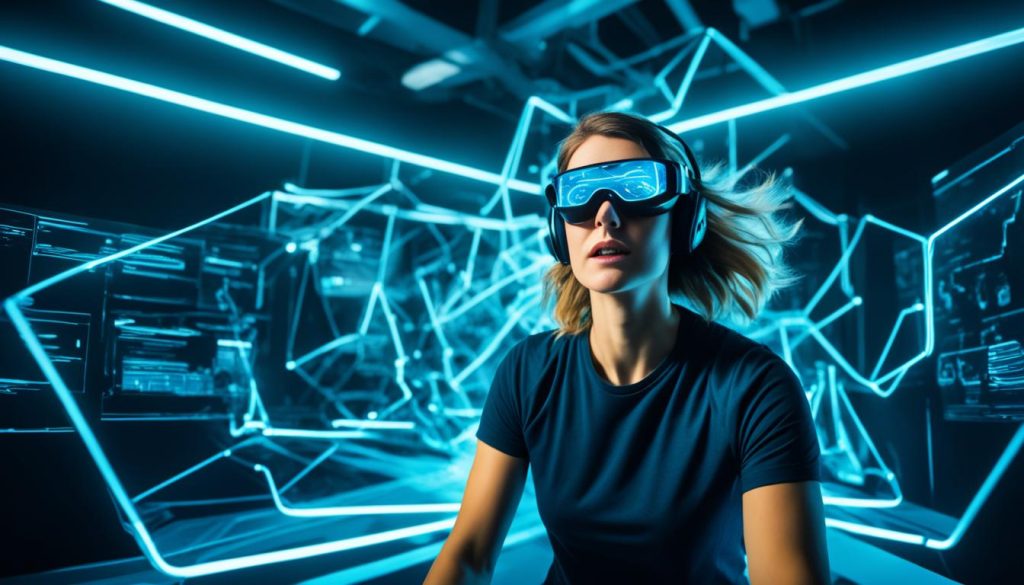Virtual realms offer a way to escape the challenges of the real world and immerse oneself in a new, exciting environment. EVE Online, a popular MMO, has emerged as a platform for education and learning, providing resources, tutorials, and communities for players to master the game and enhance their skills. This article will delve into the complexity of EVE Online education and its potential impact on the future of learning in virtual realms.
Key Takeaways:
- EVE Online is a popular MMO that offers resources and tutorials for education and learning.
- Virtual realms provide an immersive environment for exploration and skill development.
- The future of learning in virtual realms holds great promise for immersive educational experiences.
- Online communities play a significant role in knowledge sharing and collaboration within EVE Online.
- Higher education institutions are recognizing the potential of virtual realms for preparing students for the future workforce.
The Rise of Online Communities in Virtual Realms
Online communities within EVE Online have revolutionized the way players engage with virtual realms, transforming them into invaluable hubs for education and learning. These communities serve as dynamic platforms for players to share their knowledge, strategies, and tips, fostering a collaborative learning environment like no other.
Through these online communities, players can tap into a vast array of learning resources that enhance their gameplay skills and deepen their understanding of the complexities present in EVE Online. From comprehensive tutorials to insightful guides, these invaluable resources empower players to navigate the intricacies of the game with precision and expertise.
What truly sets these online communities apart is the wealth of information they provide. Players can access firsthand experiences, expert advice, and real-time discussions that continually expand their understanding of virtual realms and EVE Online education. Whether it’s unraveling the intricacies of the game’s economy or mastering advanced combat techniques, online communities serve as catalysts for growth and innovation.
The interactive nature of these communities encourages learning through active participation and collaboration. Players can engage in lively debates, seek assistance for challenging quests, and constantly refine their strategies with the help of like-minded individuals who are passionate about exploring every aspect of virtual realms. The bonds formed within these communities extend beyond the boundaries of the game, fostering a sense of camaraderie and support that enhances the overall learning experience.
As a testament to their significance, these online communities have become an integral part of the education and learning journey within EVE Online. They empower players to push the boundaries of their gaming prowess, encouraging continuous growth and development. Through the shared knowledge and resources provided by these communities, players unlock new levels of immersion, expertise, and achievement.
Joining an online community in EVE Online is like stepping into a virtual classroom filled with passionate learners, eager mentors, and a world of potential. It’s an experience that enriches the educational fabric of this virtual realm and sets the stage for a future where online communities redefine how we learn and grow in virtual landscapes.
With the rise of online communities in virtual realms like EVE Online, the boundaries of education and learning continue to expand, offering new opportunities for aspiring adventurers and seasoned veterans alike. The collaborative nature and abundance of learning resources provided by these communities fuel a curiosity-driven pursuit of knowledge, further propelling the evolution of education within virtual realms.
The Role of Higher Education Institutions in Virtual Realms
Higher education institutions (HEIs) are actively embracing the potential of virtual realms, such as EVE Online, as a powerful tool to prepare students for the future workforce. HEIs recognize the value of equipping students with the necessary knowledge, skills, and abilities to thrive in the evolving world of work.
HEIs are focused on building students’ confidence, awareness, and readiness to navigate the ever-changing technologies and workplace dynamics. They understand that the future workforce will require individuals who can adapt to new technologies and leverage virtual realms effectively.
Furthermore, HEIs are acknowledging the significance of incorporating 21st-century skills into their educational programs. Skills such as data literacy, problem-solving, programming, and creative thinking are crucial for students to excel in the virtual realms and future workplaces.
“The integration of virtual realms into higher education allows us to offer students real-world experiences and challenges within a safe and immersive environment. It enhances their critical thinking abilities, problem-solving skills, and fosters collaboration, all of which are essential for success in the future workforce.” – Dean Smith, University of Virtual Realms
Preparing Students for the Future Workforce
HEIs understand that the future workforce will require individuals who can navigate virtual realms confidently. By incorporating virtual realms into their programs, HEIs can provide students with practical experiences that bridge the gap between theory and application.
Through virtual realms, students can develop their ability to adapt to new technologies, collaborate with others, and think critically. These skills are in high demand in the digital age, where virtual interactions and remote work have become more prevalent.
Enhancing 21st-Century Skills
HEIs are realizing the importance of equipping students with relevant 21st-century skills to thrive in virtual realms and future workplaces. They are incorporating data literacy, problem-solving, programming, and creative thinking into their curricula to ensure students are well-prepared for the challenges ahead.
This focus on 21st-century skills not only prepares students for virtual realms but also positions them as valuable contributors to the future workforce. By developing these skills, students can adapt to the rapid changes in technology, analyze complex data, and propose innovative solutions.
- Data literacy: HEIs aim to develop students’ ability to interpret and understand data, enabling them to make informed decisions in virtual realms and real-world contexts.
- Problem-solving: HEIs encourage students to become adept problem solvers, equipping them with the skills to overcome challenges in virtual realms and adapt to new situations.
- Programming: HEIs recognize the importance of programming skills in virtual realms, providing students with the ability to create and modify virtual environments.
- Creative thinking: HEIs foster creativity in students, allowing them to explore innovative solutions and possibilities within virtual realms.
By focusing on these crucial skills, HEIs empower students to thrive in the virtual realms and future workplaces, where adaptability and innovation are key.
As higher education institutions continue to embrace virtual realms, they play a pivotal role in preparing students for the future workforce. By focusing on building students’ confidence, incorporating 21st-century skills, and providing practical experiences, HEIs are shaping the next generation of professionals who can navigate the dynamic landscapes of virtual realms and contribute to the future of work.
The Evolution of Extended Reality and the Metaverse
The concept of extended reality (XR) and the metaverse is gaining significant attention as the future of online experiences. XR encompasses augmented reality (AR), mixed reality (MR), and virtual reality (VR), offering users immersive and interactive digital environments that go beyond the limitations of the physical world.
Experts have varying opinions on the evolution of XR and the metaverse. Some envision a fully immersive and functional aspect of daily life for billions of people by 2040, where virtual environments seamlessly blend with the real world. Others remain skeptical about the feasibility and practicality of such a vision.
While the development of XR and the metaverse is ongoing, AR and MR enhancements are expected to become increasingly integrated into our daily lives. These technologies hold the potential to revolutionize various industries, including education, healthcare, gaming, entertainment, and social interactions.
For education, XR can create immersive learning experiences, allowing students to explore virtual environments and interact with digital elements. This interactive approach has the potential to enhance student engagement and understanding of complex concepts.
AR and MR enhancements are expected to become more useful in people’s daily lives, creating opportunities for education, healthcare, gaming, entertainment, and social interactions.
In the healthcare sector, XR can offer advanced training simulations for medical professionals, enabling them to practice complex procedures in a safe and controlled virtual environment. This can lead to improved patient outcomes and increased efficiency in healthcare delivery.
Gaming and entertainment industries can leverage XR to provide more immersive and engaging experiences. From interactive storytelling to multiplayer games, XR has the potential to transport users into virtual worlds, blurring the lines between reality and fantasy.
The development and adoption of XR technologies, however, come with challenges. Privacy and security concerns need to be addressed to ensure user data protection and prevent unauthorized access. There are also ethical considerations regarding the potential impact of surveillance capitalism on the growth of the metaverse.

The future of XR and the metaverse is still unfolding, with countless possibilities waiting to be explored. It is an exciting time as the boundaries between the physical and digital worlds continue to blur, offering new opportunities for innovation, creativity, and collaboration.
The Future of Online Education in the Metaverse
The potential of the metaverse for online education is immense. As virtual realms become more immersive and interactive, they offer unique opportunities for immersive learning experiences. Online education in the metaverse can combine traditional teaching methods with virtual simulations, gamification, and social interaction to create engaging and effective learning environments.
Students can explore virtual worlds, collaborate with peers, and interact with AI-driven entities to enhance their learning outcomes. Imagine a history lesson where students can witness important historical events unfold in real-time, or a science class where they can conduct virtual experiments without any limitations. The metaverse opens up a world of possibilities for educators and students.
Through immersive learning, students can develop critical thinking, problem-solving, and creativity, essential skills for the ever-changing future. The metaverse provides a platform for active learning, where students can apply theoretical concepts to practical scenarios and gain hands-on experience.
Immersive learning in the metaverse empowers students to become active participants in their education, enhancing their engagement and motivation to learn. By creating virtual communities and collaborative spaces, online education in the metaverse fosters social interaction, teamwork, and the exchange of ideas, replicating the dynamic learning environments of traditional classrooms.
Furthermore, the integration of blockchain technology in the metaverse may revolutionize the way credentials are validated and recognized. Blockchain’s transparency and security provide a trusted framework for issuing and verifying certifications and accreditations, ensuring that students’ achievements carry weight and value in the digital world.
With the rapid advancements in technology and the increasing demand for flexible and accessible education, the future of online education in the metaverse holds immense potential. It offers a new dimension of learning that combines the best of virtual realms and traditional education, creating an immersive and transformative educational experience.

Advantages and Challenges of EVE Online Education
EVE Online education provides numerous advantages that contribute to the development of critical thinking, problem-solving, teamwork, and leadership skills. The intricate mechanics and real-time decision-making required in the game foster a unique learning experience. As players navigate the complexities of EVE Online, they are constantly challenged to strategize, analyze data, collaborate with others, and take on leadership roles within their virtual organizations.
This immersive learning environment allows individuals to apply theoretical knowledge in practical situations, honing their problem-solving skills and reinforcing their understanding of complex concepts. The hands-on nature of EVE Online education cultivates a proactive mindset, encouraging players to actively seek innovative solutions to overcome obstacles and achieve their goals.
However, virtual learning environments also pose challenges that need to be addressed. One of the main challenges is the need for self-motivation. Without the structure and deadlines of traditional classroom settings, students in virtual learning environments must possess strong self-discipline and motivation to stay on track and complete their educational tasks.
Effective time management is another crucial skill for success in EVE Online education. Balancing academic commitments with other personal and professional responsibilities can be demanding, as players need to allocate sufficient time to study, engage with the community, and progress in the game. Developing effective time management strategies and prioritizing tasks are essential to ensure a productive and fulfilling learning experience.
Equitable access to resources and support is also a significant challenge in virtual learning. While some players may have easy access to high-speed internet, advanced hardware, and a supportive learning environment, others may face barriers that limit their ability to fully engage in EVE Online education. Overcoming these disparities and ensuring equal opportunities for all learners is crucial for the inclusivity and effectiveness of virtual learning environments.
The role of higher education institutions and educators is paramount in navigating these challenges and maximizing the benefits of EVE Online education. Their guidance and support help students overcome obstacles, develop effective study habits, and make the most of the learning opportunities provided by the game. By providing mentorship, resources, and a structured learning framework, higher education institutions support the integration and application of EVE Online education into traditional academic pathways.
“EVE Online education offers a unique blend of immersive gameplay and educational experiences. It challenges students to think critically, collaborate, and develop leadership skills – all essential qualities for success in the real world.” – Dr. Lisa Thompson, Professor of Education at Stanford University
By embracing the advantages of EVE Online education and addressing the challenges of virtual learning, we can unlock the vast potential of this innovative approach to education. With the support of higher education institutions and educators, students can gain invaluable skills and experiences that prepare them for the future workforce and contribute to their personal growth and development.
Advantages of EVE Online Education:
- Development of critical thinking skills
- Enhancement of problem-solving abilities
- Promotion of effective teamwork
- Cultivation of leadership skills
Challenges in Virtual Learning:
- Need for self-motivation
- Effective time management
- Ensuring equitable access to resources and support

Conclusion
EVE Online education and the future of learning in virtual realms hold great promise for immersive, engaging, and effective educational experiences. The rise of online communities, such as those within EVE Online, has provided a valuable platform for collaboration and knowledge sharing among players. These online communities have become integral to the learning experience within virtual realms, allowing players to access resources, tutorials, and guides to enhance their skills and knowledge.
Furthermore, higher education institutions have recognized the potential of virtual realms as a tool for preparing students for the future workforce. They are incorporating 21st-century skills and leveraging the interactivity of virtual environments to equip students with the necessary knowledge and abilities to thrive in the digital age.
As extended reality and the concept of the metaverse continue to evolve, the future of online education in virtual realms becomes even more exciting. Immersive learning experiences, powered by virtual simulations, gamification, and social interaction, offer unique opportunities for students to explore and engage with their educational content. The integration of blockchain technology may also lead to new models of accreditation and certification within virtual realms.
In conclusion, EVE Online education is just the beginning of a new frontier in education and learning. As technology advances, it is crucial to address the challenges and fully explore the potential of virtual realms in preparing students for the future workforce. The future of learning in virtual realms holds great promise, and it is an exciting time to be at the forefront of this educational revolution.




No comments! Be the first commenter?